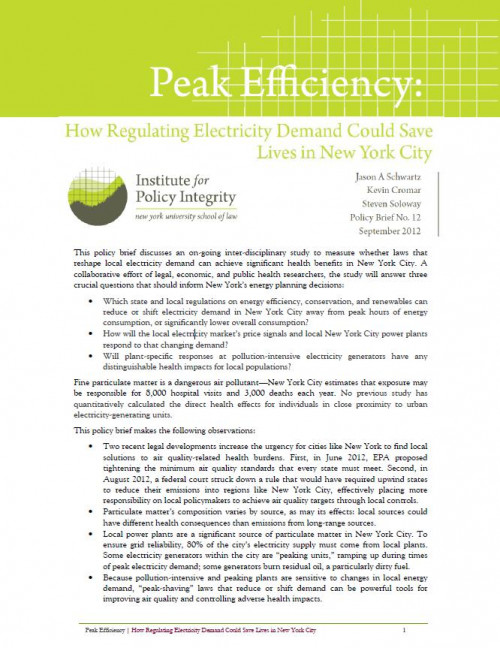-
Comments on Con Edison Storm Hardening and Resilience Collaborative Report
On January 10, Policy Integrity, along with New York University’s Guarini Center, submitted comments on Con Edison’s Storm Hardening and Resilience Collaborative Report. The comments urge New York’s Public Service Commission (PSC) to extend the charter of the cost-benefit analysis working group convened as part of the collaborative process surrounding Con Edison’s latest ratemaking proceeding.
-

Peak Efficiency
How Regulating Electricity Demand Could Save Lives in New York City
This policy brief discusses an on-going inter-disciplinary study to measure whether laws that reshape local electricity demand can achieve significant health benefits in New York City. A
collaborative effort of legal, economic, and public health researchers, the study will answer crucial questions that should inform New York’s energy planning decisions -
New York City Energy Data
Policy Integrity is conducting an empirical analysis of power plant emissions in New York City to evaluate the potential efficacy of various policy tools that can reduce or shift electricity demand. The complete project will quantify the health impacts of reducing pollution from specific local sources, and will try to connect the range of legal options available to shift demand with those pollution-reduction and health-improvement outcomes. Today we are posting information on the data and the STATA code that we will use to conduct the analysis. In the coming months, we will publish the results of our analysis as it becomes available.
-
EPA Releases NSPS for Power Plants
The EPA released its first ever greenhouse gas standards for new power plants after a delay at the beginning of the year. The New Source Performance Standards (NSPS) limit emissions from new plants to 1,000 pounds of carbon dioxide per megawatt hour of electricity produced.
-
EPA Delays NSPS
The EPA has again delayed its proposal of New Source Performance Standards (NSPS) targeting greenhouse gas emissions from power plants. The agency passed a September settlement agreement deadline and has not set a date for the actual release.
-
Launch of Energy Tax Breaks Wiki
Policy Integrity recently launched a wiki aimed at providing a better understanding of how energy sectors are subsidized by the tax code. The wiki will gather the expertise of lawyers, economists, tax professionals, and concerned citizens to catalog tax breaks received by the fossil and renewable energy industries.
-
Letter to OIRA on NSPS
The federal regulation of greenhouse gases from coal-powered plants called “New Source Performance Standards” has been delayed several times but is now set to be released in early 2012.
-
DOE’s Final policy on fuel cycle fuel analysis
The U.S. Department of Energy (DOE) recently announced its final policy on incorporating full fuel cycle analysis. This form of analysis expands on the current way of estimating the energy savings of appliances by including the costs of everything from fuel extraction to distribution and also estimating the greenhouse gas impacts of the machine.
-
NYC to phase out most-polluting heating oils
Mayor Bloomberg recently announced that the city will phase out the use of unrefined oil sludge and the most-polluting grades of heating oil, to be completed by 2030. The new rules target the airborne fine particulate matter from two grades of heating oil that when burned by buildings create more than 85% of the city’s heating oil soot emissions. It’s expected that 10,000 buildings will be affected, as the black smoke billowing from smokestacks that the city says is responsible for killing 3,000 residents each year is eliminated.
-
Jason Schwartz gives testimony on NYC heating oil rule
Today, the city is conducting hearings on a regulation that the Bloomberg administration released last month to address the soot pollution from residual oil.
Viewing recent projects in Electricity
